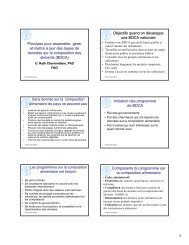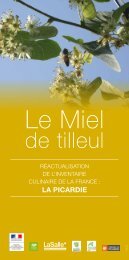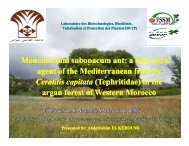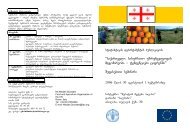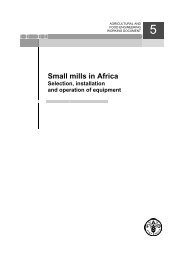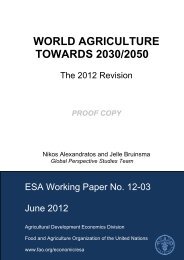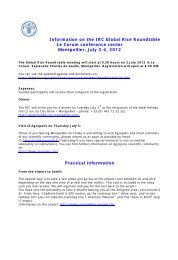Climate Change and Food Security: setting the track for the ... - FAO
Climate Change and Food Security: setting the track for the ... - FAO
Climate Change and Food Security: setting the track for the ... - FAO
Create successful ePaper yourself
Turn your PDF publications into a flip-book with our unique Google optimized e-Paper software.
A quick note to agree with Thinlay Baap -- we really do need to look at <strong>the</strong> mechanisms of how<br />
<strong>the</strong> rich countries--<strong>and</strong> those responsible <strong>for</strong> most of <strong>the</strong> impact -- can assist countries in<br />
adaptation <strong>and</strong> mitigation. Is <strong>the</strong>re potential to direct some carbon trading system to address<br />
<strong>the</strong>se issues? It would need to be a mechanism which looked at directly assisting communities,<br />
who would in turn take on responsibilities. It may be expensive to implement <strong>and</strong> monitor<br />
systems that are not government based - but it would be worthwhile if it really empowered<br />
communities to invest in local adaptation <strong>and</strong> mitigation strategies <strong>and</strong> provided <strong>the</strong>m with real<br />
trading power.<br />
In <strong>the</strong>ir analysis <strong>the</strong> HLPE also need to consider <strong>the</strong> impact on biodiversity <strong>and</strong> agrobiodiversity<br />
in particular <strong>and</strong> <strong>the</strong> long term food security issues.<br />
Thanks very much <strong>for</strong> an interesting <strong>for</strong>um.<br />
Kay<br />
Kay Muir Leresche<br />
South Africa<br />
12. K V Peter from India<br />
In <strong>the</strong> name of development of infrastructure like 6 lanes road, <strong>the</strong>re is cutting of well<br />
established trees providing shade to pedestrians <strong>and</strong> greening <strong>the</strong> surroundings. Pollution level<br />
is souring up in urban areas. Incidence of lung diseases, cancer <strong>and</strong> skin diseases are souring up.<br />
It has to be m<strong>and</strong>atory, that a tree is cut only after establishing ano<strong>the</strong>r tree to a reasonable age.<br />
Garbage disposal is ano<strong>the</strong>r disturbing fact in India. <strong>Climate</strong> change may be disastrous to<br />
tropical agriculture but may be boosting productivity of temperate agriculture. The total global<br />
production of agriculture may remain unaffected but <strong>the</strong> developing countries in tropics may<br />
suffer. The strength of tropics like vast human power, water resources, soil resources <strong>and</strong> above<br />
all <strong>the</strong> potential market need to be tamed to advantage.<br />
K V Peter<br />
13. Roy Stacy from <strong>the</strong> USA<br />
Dear Moderator,<br />
This is indeed a complex subject <strong>and</strong> <strong>the</strong> climate change/food security intersect will play out<br />
very differently in diverse locations. There will be winners <strong>and</strong> losers when it to agriculture, <strong>for</strong><br />
instance areas of Canada <strong>and</strong> <strong>the</strong> Soviet Union. For o<strong>the</strong>rs adaptation, particullarly farming<br />
systems, will be a major challenge <strong>and</strong> one that demends international help. As much as climate<br />
change is a concern, in <strong>the</strong> more immediate future it is climate <strong>and</strong> rainfall varability that has<br />
been accelerating <strong>for</strong> <strong>the</strong> last 60 years that pose <strong>the</strong> biggest challenge to grain producers. In<br />
Ethiopia <strong>for</strong> example, perhaps <strong>the</strong> most famine threatned country in <strong>the</strong> world, FEWS NET <strong>and</strong><br />
<strong>the</strong> USGS have published assessments that show a pattern of widening varaibility in seasonal<br />
rainfall, but when <strong>the</strong> good <strong>and</strong> bad years are averaged out, <strong>the</strong>re has been an annual decline of<br />
some 5.8 millimeters of rainfall over <strong>the</strong> major grain producing areas. In a country of 70 million<br />
people, where 97 of grain production is rainfed, this is a serious threat. We are told that <strong>for</strong><br />
longer term climate change, it is still uncertain what will transpire in <strong>the</strong> Horn of Africa, wetter<br />
or drier? But we know what rainfall varability is doing right now. When mixed with <strong>the</strong> global<br />
grain price volatility of recent years, <strong>and</strong> r<strong>the</strong> enhanced short term food security threat is<br />
worrisome.<br />
__________________________________<br />
Global Forum on <strong>Food</strong> <strong>Security</strong> <strong>and</strong> Nutrition<br />
http://km.fao.org/fsn<br />
12



